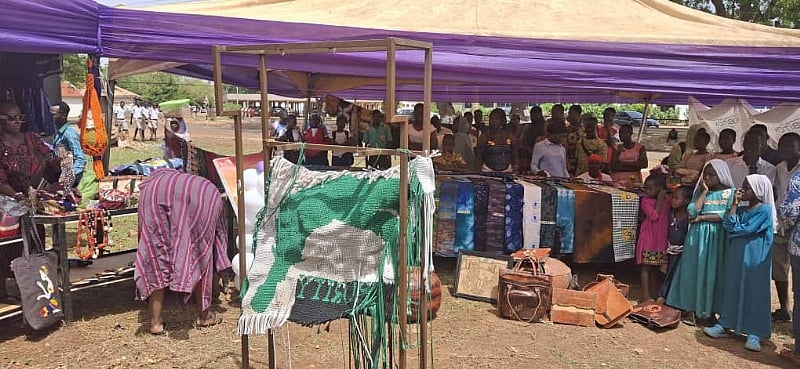The Textile Designs and Technology Department of Tamale Technical University (TaTU) has held its maiden Students Project Exhibition, spotlighting the creativity and technical skills of its students.
The exhibition, held at the front of the department, attracted industry stakeholders, academics, students from second-cycle institutions, and the general public. Attendees were treated to an array of innovative projects that reflect the department’s growing contribution to Ghana’s textile sector.
Beyond showcasing talent, the event also served to educate the public on the department’s academic offerings and their potential for economic and entrepreneurial growth, especially among the youth.
Held under the theme “Innovating the Future of Textiles,” the exhibition featured diverse student projects in textile design, production, and technology. From traditional African prints to modern sustainable fashion, the works highlighted the department’s commitment to merging cultural heritage with modern design thinking.
Among the most impressive pieces were a vibrant collection of batik fabrics crafted from locally sourced materials and dyed using eco-friendly methods. Another eye-catching display was a clothing line made entirely from repurposed plastic waste, underlining the students’ commitment to sustainability and innovation.
Dr. Aziz Danaa, Head of the Textile Designs and Technology Department, praised the students’ efforts and the department’s progress.
“This event is a testament to the hard work and dedication of our students and lecturers. We are excited to see our students make a meaningful impact in the textiles industry and beyond”, he said.
He added that the exhibition created valuable opportunities for collaboration and feedback: “The exhibition also provided a platform for industry players and students to interact with our students, offering valuable feedback and insights that will shape the future of textiles design and technology in Ghana.”
Dr. Danaa further emphasized the importance of such engagements for national development. “It was also ensure network with the students and the industry players in contributing to the economy of Ghana,” he added.
He concluded that the event was a significant success and underscored the department’s potential to drive innovation and creativity in the textile industry.
Hajia Dr. Fatima Ibrahim, a lecturer and supervisor of the student projects, reflected on the department’s growth, especially during the COVID-19 period.
“During Covid-19, that was when the textile industry really strived because it made people realizes what textile itself is about,” she said. “It is not just about the textile components of the fabric, but it has to do with what the products are and what different techniques are in the textile industry itself. So for now, it is really striving even beyond the industry as in the printing of the fabrics, and the wax prints.”
She noted the breadth of skills taught in the programme: “Entering into the clothing aspects of crocheting, macramé, needlework, applique, embroidery, tire and dye, weaving among others are all techniques under the textile design and technology programmes,” she noted.
On opportunities, she said the department provides a foundation for both primary and side careers. “This is the best place to train the young ones for the main and side job at the same time,” she added.
However, the department also faces significant challenges. “One of the challenges confronting the department has to do with the machines, modern equipment, and even studios for the training of our students,” she said.
Acknowledging financial constraints, she appealed for support: “Since we are a younger department, we are trying our best to come up with all the tools and the materials that are needed to make all the products that are taught under the textile design but financially constraints and therefore appealed to government and donor agencies for support,” he appealed.
She highlighted the department’s growth over a short period. “We started in 2021 with a very few students coming up but as of 2025 academic year, we can boast of about 200 students of which other departments under the faculty are very surprised as to the number of students who have turned out for this programme,” she said.
“We are really rising, we are soaring, and we are hoping in the next five years, we will be the department that have the most students,” she added.
She reiterated the department’s commitment to developing job-ready graduates. She said the goal is to train students to be innovative and creative, complementing government efforts at job creation.


